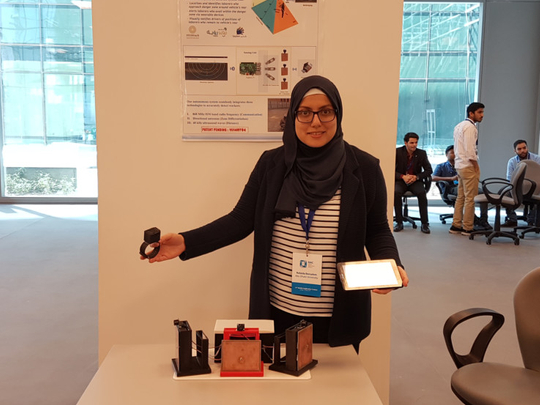
Abu Dhabi: Students from multiple universities showcased their innovative mobile applications on Sunday as part of Khalifa Univerity’s Mobile App Contest, which encouraged students to create apps that would have a beneficial impact on the community at large.
Among the apps that were created was Salama, a monitoring and detection system to reduce the risk of backover accidents on construction sites.
“Backover accidents are basically when a truck reverses and the driver can’t see all the blind spots behind the truck, and so by accident, the driver will hit the workers that are working at the back causing either injury or death,” explained Rofaida Bensalem, an Algerian student at Abu Dhabi University who took part in developing the app.
“So our app has been designed to overcome this issue. The system is made up of three parts. The first one is the main sensing unit that is placed at the rear of the truck. The second [part] is the wearable device that is worn by the worker, and finally, the display screen tablet that is placed on the driver’s dashboard.”
Bensalama said that all three parts work together to detect and warn the driver and worker about avoiding a collision.
“When the truck is reversing, the main sensor unit sends a wireless request to see if anyone is in the danger zone. The sensor detection area is four meters. If a worker is in the danger zone, the device that they wear will send a signal to the main sensor and based on the strength of the signal, the sensor can tell which direction and where the worker is.
“All of this data about the worker’s direction and location is immediately sent to the main tablet device in less than a second, and the driver will be able to see that there are workers behind the truck,” she added.
Bensalama said that the wearable device worn by the worker also warns them about the truck.
“It is a two-way communication, the system is warning the driver and also warning the workers at the back.
“The wearable device has two mechanisms, vibrating and buzzing, so when the driver wants to back up and the main sensor detects the worker, the device that he is wearing will vibrate notifying him about the truck and so he can then move out of the way,” she added.
Bensalam said that statistics of backover accidents in the UAE were not available, but that in the US, 800 people were killed as a result of such accidents, and in France, 12 per cent of construction accidents were caused by back over accidents.
Another app that was featured was the Augmented Reality Anatomy, an educational app to make biology lessons more fun for school children.
“We developed an educational mobile app to be used in school classrooms to teach students about human organs in a more enjoyable and fun way,” said Doaa Mahely, a Yemeni student at Al Hosn University who helped build the app.
“So with the app, a person aims the mobile at anyone and it will be able to recognise the body and display the human anatomy. After you see the human anatomy, you can click on it and the displayed information will come up about that organ in both English and Arabic, in both text and audio,” she added.
Mahely explained that the students used what’s known as Augmented Reality technology, which allows the app to detect the body and visualise 3D models of the organs.
“It took us a few months to build the app. The main goal is to make things more visual for students and to motivate them more,” she said.
“We tested it at one school and the kids were really excited about the app and enjoyed using it; the app made them much more engaged,” she added.











